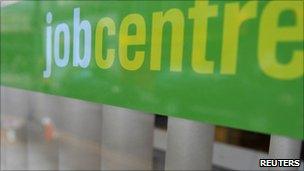Go Figure: The youth unemployment mystery
- Published

Youth unemployment is a key issue for politicians
Beware looking at the youth unemployment rate and bemoaning a unique lost generation, Michael Blastland says in his regular column.
How bad is youth unemployment? Is it "whe worst ever"? Or "a lost generation"?
The first is just wrong. The second seems less descriptive than cruel - "forget it, kids, life's over before your mid 20s".
The grim stats are that about 750,000 18-24 year olds are unemployed, a rate of about 18%.
But on raw numbers, the 1990s were higher despite a smaller population. Fact.
Was that also a lost generation?
The youth unemployment rate is higher now. But the rate is not the unemployed share of all youths. It's the unemployed share of youths excluding those in education or otherwise unavailable for work.
So, oddly, if more go into education, the rate goes up, since the unemployed are a bigger fraction of the smaller number that remains.
The slider shows how it works. Slide the arrows.
*"Further education" also includes those not available for work for other reasons
The move into education has been a big factor, making the rate higher when the numbers are lower. In theory, it's possible for the number of young people looking for a job to go down while their unemployment rate rises to 50 or even 100%.
Simon Briscoe, former stats editor at the Financial Times, civil servant at what was then the Central Office of Statistics, and now of Timetric, highlighted the problem this week with .
It remains true that youth unemployment is far worse than anyone could want - bad, in a word. But how bad?
If that seems hair-splitting, fair enough. For some, once a problem passes "bad" there is no question of degree that is not insulting. Otherwise, read on.
One reason the media and co describe youth unemployment as the worst ever is because the that measures it only became continuous in 1992, and the years since included the longest uninterrupted economic growth in modern UK history.
The "worst ever" rate does not even look at the 1980s recession. The "worst ever" compares now with one previous example of recession (the early 1990s) and one period of long boom.
Using other measures, like the claimant count, the 1980s looks far worse, even allowing for rule changes to who can claim.
Was that too a lost generation?
If so, we're now up to three lost generations in the last 30 years, two of them worse than this one - so far.
But maybe that's right. Maybe all those who felt consigned to the scrapheap - of all ages - deserve to be called lost generations. Or maybe some young people at least can take heart that things improved then and may do now.
The youth unemployment measurement problem caused by education isn't new. Briscoe wrote about it in his book Britain in Numbers in 2005. It's been haunting the youth unemployment numbers for years.
There have been several waves of high youth unemployment
Others have pointed out that it makes a mess of international comparisons. Once, in the good times, many in Britain boasted of our flexible labour market compared with France, proved partly by our lower youth unemployment rate. In fact, France just sent more people to university.
They had about the same number of young people out of work as we did, but their rate appeared higher. So a higher youth unemployment rate isn't necessarily worse.
Some object that jobs are no good now, so lower unemployment is little consolation. New graduates often say they can't find anything decent.
But I'm not sure how we can be confident that the jobs to be had in recessions past - when unemployment was higher - were so much better than jobs now.
Unemployment is miserable enough. Arguments that it can be exaggerated risk sounding like unfeeling disaster reports of the "not many dead" kind.
For any individual, it can indeed wreck years of life. On the other hand, does anyone wonder if the 'worst ever', 'lost generation' comments come with too much relish - and too little regard for the past?
